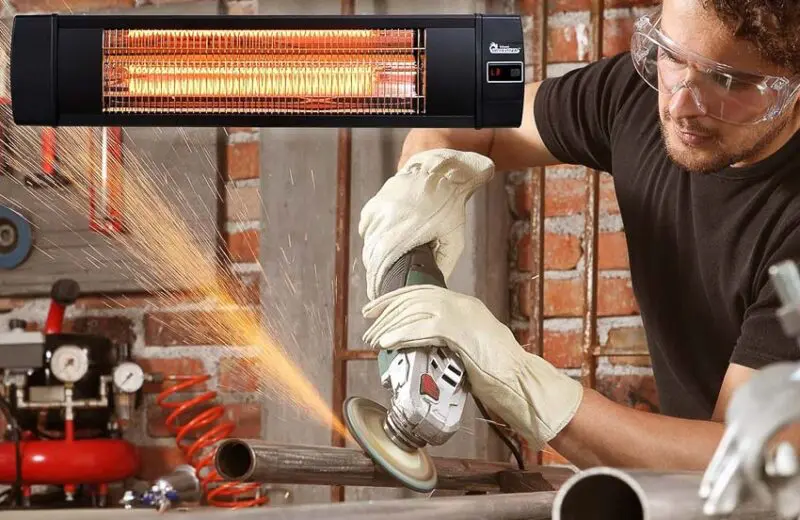When the weather gets cold, your garage can quickly turn into an uncomfortable space. Whether you’re working on a project, using it as a workspace, or just need a warm spot to park your car, a garage heater is an essential investment. Choosing the right garage heater can help you stay warm without breaking the bank or consuming too much energy. In this article, we’ll cover the different types of garage heaters, important features to consider, and tips to make sure you pick the best option for your needs. Let’s dive into the world of garage heaters and find the perfect fit for you.
Types of Garage Heaters
Electric Garage Heaters
Electric garage heaters are one of the most popular options for homeowners due to their ease of use and safety features. These heaters typically come in wall-mounted or portable designs, making them versatile for various garage setups. Electric heaters are ideal for smaller garages or spaces that are well-insulated, as they offer a convenient way to add warmth without the need for extra fuel or venting systems.
Electric heaters also come in two main types: forced air and radiant. Forced air electric heaters blow warm air into the room, quickly raising the temperature, while radiant heaters use infrared technology to directly warm objects and people in the space. One major advantage of electric heaters is their minimal maintenance and no need for ventilation. However, they can be less efficient in larger, poorly insulated garages, as they may struggle to keep the temperature steady.
Gas Garage Heaters
Gas-powered heaters are an excellent choice for larger garages or those located in colder climates. These heaters use either natural gas or propane to generate heat, and they often provide a more powerful and consistent warmth compared to electric models. Gas heaters are typically vented, which means they require a proper installation setup to safely vent exhaust gases outside.
One of the biggest benefits of gas heaters is their ability to heat a larger space quickly and effectively. They are highly efficient and can run for longer periods without needing a lot of electricity, making them a cost-effective option for extended use. However, gas heaters do require careful installation and maintenance. The venting system must be properly installed to avoid the buildup of harmful gases inside the garage.
Propane Garage Heaters
Propane garage heaters are another type of gas-powered heater, and they are ideal for situations where you don’t have access to natural gas lines. These heaters are portable, making them an excellent option if you need to heat your garage temporarily or in remote locations. Propane heaters are especially popular for garages that are used for workshops, as they can heat a large area without requiring a fixed installation.
While propane heaters are effective at warming a space, they require a propane tank for fuel, which means you’ll need to regularly monitor your tank levels. One advantage of propane heaters is their portability, allowing you to move the heater from one area to another if needed. However, like all gas-powered heaters, propane heaters need to be used with caution. Ensure proper ventilation and be aware of potential gas leaks or other safety risks.
Infrared Garage Heaters
Infrared garage heaters are a unique option that uses infrared radiation to heat objects and people in a direct path, rather than heating the air around them. These heaters work similarly to the sun’s rays, warming up surfaces and people without needing to heat the entire space. This can be an efficient way to maintain comfort without using a lot of energy.
Infrared heaters are ideal for garages with specific heating needs, such as warming a workbench area or providing localized heat. They are also a great option for quickly warming up smaller spaces. However, their effectiveness can be limited in larger, open garages. Infrared heaters are also available in both portable and wall-mounted models, making them easy to install or move depending on your garage layout.
Key Features to Consider When Buying a Garage Heater
Heating Capacity (BTUs)
One of the most important factors to consider when purchasing a garage heater is its heating capacity, usually measured in BTUs (British Thermal Units). The BTU rating indicates how much heat the heater can produce over time, and it’s crucial to match the heater’s capacity with the size of your garage. A heater with a low BTU rating may struggle to heat a large garage, while a heater with too high a BTU rating may waste energy and result in uneven heating.
To determine the appropriate BTU rating for your garage, measure the square footage of the space and consider factors like insulation, the number of windows, and the climate in your area. As a general rule of thumb, a garage of 500 square feet will require a heater with about 5,000 to 10,000 BTUs. However, larger garages, particularly those with poor insulation, will need a higher BTU rating to maintain a comfortable temperature.
Energy Efficiency
Choosing an energy-efficient garage heater is key to saving money on heating costs in the long run. Look for heaters that have high energy efficiency ratings, as these will use less energy to produce the same amount of heat. Electric heaters tend to be more energy-efficient than gas-powered options, as they convert almost all of the electricity they use into heat. However, gas heaters can be more cost-effective for larger spaces or extended use.
When evaluating energy efficiency, also consider the type of fuel your heater uses. Propane and natural gas heaters can be more efficient in larger spaces, but they also require additional maintenance and monitoring. Look for models with adjustable thermostats or energy-saving modes to help control energy consumption.
Safety Features
Safety is an important consideration when choosing a garage heater. Since garages are often used for storing tools, chemicals, and other combustible materials, it’s essential to select a heater with built-in safety features. Look for heaters that have an automatic shutoff feature if the unit overheats or if it tips over. Additionally, make sure the heater is equipped with proper ventilation to prevent the buildup of dangerous gases, especially in gas or propane-powered heaters.
Many modern garage heaters come with additional safety features such as anti-tip switches, overheat protection, and cool-to-the-touch exteriors. These features not only keep you safe but also ensure that the heater operates smoothly and efficiently for years to come.
Portability vs. Fixed Installation
When deciding between a portable or a fixed installation garage heater, think about how you’ll use the heater and the layout of your garage. Portable heaters are easy to move and reposition, making them ideal for smaller garages or temporary use. They are often less expensive and can be stored away when not in use.
On the other hand, fixed installation heaters are permanent and often more powerful. These units are ideal for larger garages or those that require constant heating. Fixed heaters may take up more space but offer more consistent heating over time. The choice between a portable or fixed heater depends on your specific needs and budget.
Factors to Consider for Your Garage Heater
Garage Size and Insulation
The size and insulation of your garage are crucial factors in choosing the right heater. Larger garages require more powerful heaters to ensure even heating throughout the space. If your garage is poorly insulated, you may need a higher BTU-rated heater to compensate for heat loss through walls, doors, and windows. Insulated garages retain heat better, meaning you can opt for a smaller, less expensive heater.
Consider the layout of your garage and whether it has sections that need specific heating. If your garage is used as a workspace or workshop, you may need a more localized heating solution, such as an infrared heater. However, if the garage is used mainly for parking cars, a central heating solution like a forced-air gas heater may work best.
Climate and Weather Conditions
Your location and climate play an important role in selecting a garage heater. In colder climates, you’ll need a more powerful heater to maintain a comfortable temperature. Areas that experience extreme winters may benefit from a gas or propane heater, which can provide a consistent heat output over a long period. On the other hand, if you live in a milder climate, an electric heater may be sufficient for occasional use.
In addition to climate, consider whether you need to heat your garage year-round or just during the winter months. If you only need heating during the colder months, a portable heater or temporary setup might be more practical. If you need heat year-round, a permanent, more robust solution could be a better investment.
Budget
Garage heaters come in a wide range of prices, so it’s important to choose one that fits your budget while still meeting your needs. Electric heaters tend to be more affordable, especially for smaller garages, but they may not be powerful enough for larger spaces. Gas and propane heaters are generally more expensive but can be more cost-effective for larger or poorly insulated garages.
While it may be tempting to go for the cheapest option, keep in mind that you might end up spending more on electricity bills or maintenance costs in the long run. Look for a heater that offers good energy efficiency and comes with necessary safety features to protect your investment.
Top 5 Garage Heaters for 2024
Here are five of the best garage heaters for 2024, known for their reliability, performance, and safety features:
- Mr. Heater F232000 MH9BX – This portable propane heater is perfect for small to medium-sized garages. It provides up to 9,000 BTUs and has an automatic shut-off feature for added safety.
- DeLonghi HMP1500 Mica Thermic Panel Heater – A sleek, wall-mounted electric heater that’s great for garages with limited space.
- Cadet Com-Pak Plus – A powerful, electric heater designed for larger garages, offering quiet operation and energy efficiency.
- Dyna-Glo RA18LPDG – A propane heater suitable for larger garages, known for its fast heating capabilities and durable construction.
- Fahrenheat FUH54 – A hardwired, forced-air electric heater that delivers 5,000 to 17,000 BTUs, perfect for well-insulated or medium-sized garages.
Installation Tips for Garage Heaters
When installing a garage heater, make sure you follow the manufacturer’s guidelines and safety recommendations. Electric heaters typically require less installation, as many are plug-and-play models. However, ensure the heater is placed in a location that doesn’t obstruct airflow. For gas or propane heaters, installation may require professional help to ensure proper venting and safety measures.
For fixed models, placement is key. Ideally, you want the heater to be positioned where it can evenly distribute warmth across the entire garage, avoiding corners or areas that may block airflow. Always check local building codes and consider hiring a professional if you’re installing a gas-powered heater.
Maintenance and Care for Your Garage Heater
To keep your garage heater running efficiently, regular maintenance is essential. For electric heaters, cleaning dust and debris from the vents and ensuring that the unit is free from blockages can help maintain optimal performance. Gas and propane heaters need to be inspected for gas leaks, and the venting system should be checked annually.
Make sure to replace any filters or parts as recommended by the manufacturer, and always follow safety guidelines to avoid potential risks. Proper care ensures that your heater runs smoothly and safely, extending its lifespan.
Conclusion
Choosing the best garage heater depends on your specific needs, including the size of your garage, insulation, and climate. By considering the different types of heaters, their features, and key factors like safety and energy efficiency, you can make an informed decision. A well-chosen heater will keep your garage comfortable, allowing you to enjoy your space year-round.




